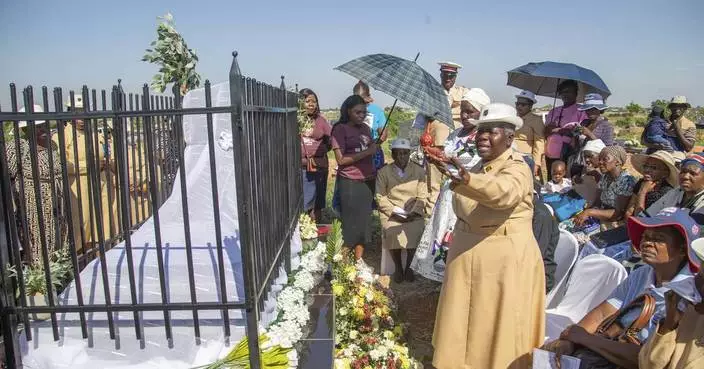WASHINGTON (AP) — Two recently retired senior Israeli intelligence agents shared new details about a deadly clandestine operation years in the making that targeted Hezbollah militants in Lebanon and Syria using exploding pagers and walkie talkies three months ago.
Hezbollah began striking Israel almost immediately after Hamas’ Oct. 7, 2023, attack that sparked the Israel-Hamas war.
The agents spoke with CBS “60 Minutes” in a segment aired Sunday night. They wore masks and spoke with altered voices to hide their identities.
One agent said the operation started 10 years ago using walkie-talkies laden with hidden explosives, which Hezbollah didn't realize it was buying from Israel, its enemy. The walkie-talkies were not detonated until September, a day after booby-trapped pagers were set off.
“We created a pretend world,” said the officer, who went by the name “Michael.”
Phase two of the plan, using the booby-trapped pagers, kicked in in 2022 after Israel's Mossad intelligence agency learned Hezbollah had been buying pagers from a Taiwan-based company, the second officer said.
The pagers had to be made slightly larger to accommodate the explosives hidden inside. They were tested on dummies multiple times to find the right amount of explosive that would hurt only the Hezbollah fighter and not anyone else in close proximity.
Mossad also tested numerous ring tones to find one that sounded urgent enough to make someone pull the pager out of their pocket.
The second agent, who went by the name “Gabriel,” said it took two weeks to convince Hezbollah to switch to the heftier pager, in part by using false ads on YouTube promoting the devices as dustproof, waterproof, providing a long battery life and more.
He described the use of shell companies, including one based in Hungary, to dupe the Taiwanese firm, Gold Apollo, into unknowingly partnering with the Mossad.
Hezbollah also was unaware it was working with Israel.
Gabriel compared the ruse to a 1998 psychological film about a man who has no clue that he is living in a false world and his family and friends are actors paid to keep up the illusion.
“When they are buying from us, they have zero clue that they are buying from the Mossad,” Gabriel said. “We make like ‘Truman Show,’ everything is controlled by us behind the scene. In their experience, everything is normal. Everything was 100% kosher including businessman, marketing, engineers, showroom, everything.”
By September, Hezbollah militants had 5,000 pagers in their pockets.
Israel triggered the attack on Sept. 17, when pagers all over Lebanon started beeping. The devices would explode even if the person failed to push the buttons to read an incoming encrypted message.
The next day, Mossad activated the walkie-talkies, some of which exploded at funerals for some of the approximately 30 people who were killed in the pager attacks.
Gabriel said the goal was more about sending a message than actually killing Hezbollah fighters.
“If he just dead, so he’s dead. But if he’s wounded, you have to take him to the hospital, take care of him. You need to invest money and efforts,” he said. “And those people without hands and eyes are living proof, walking in Lebanon, of ‘don’t mess with us.’ They are walking proof of our superiority all around the Middle East.”
In the days after the attack, Israel's air force hit targets across Lebanon, killing thousands. Hezbollah's leader, Hassan Nasrallah, was assassinated when Israel dropped bombs on his bunker.
By November, the war between Israel and Hezbollah, a byproduct of the deadly attack by Hamas militants in southern Israel on Oct. 7, 2023, ended with a ceasefire. More than 45,000 Palestinians have been killed in the war in Gaza between Israel and Hamas militants, health officials have said.
The agent using the name “Michael” said that the day after the pager explosions, people in Lebanon were afraid to turn on their air conditioners out of fear that they would explode, too.
“There is real fear,” he said.
Asked if that was intentional, he said, “We want them to feel vulnerable, which they are. We can’t use the pagers again because we already did that. We’ve already moved on to the next thing. And they’ll have to keep on trying to guess what the next thing is.”
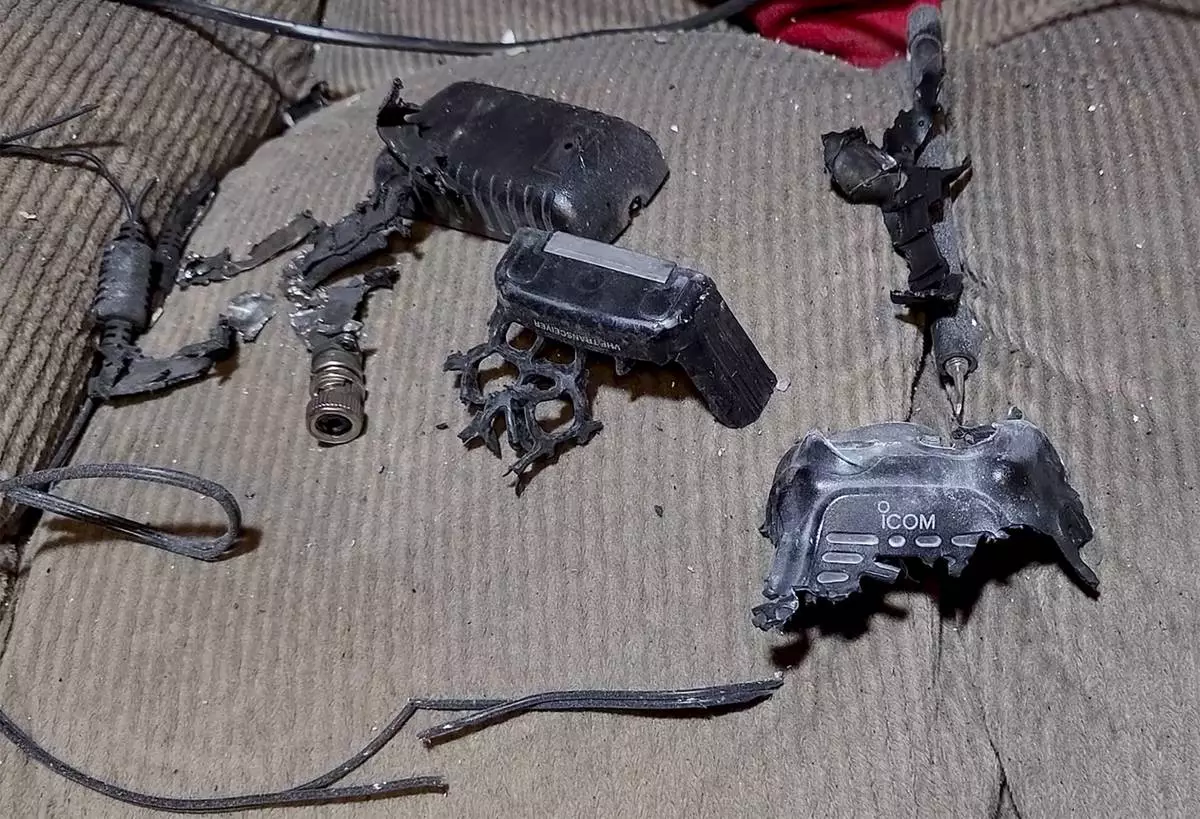
FILE - This image taken from video shows a walkie-talkie that was exploded inside a house, in Baalbek, east Lebanon, Sept. 18, 2024. (AP Photo, File)

FILE - Hezbollah fighters carry one of the coffins of four fallen comrades who were killed Tuesday after their handheld pagers exploded, during their funeral procession in the southern suburb of Beirut, Lebanon, Wednesday, Sept. 18, 2024. (AP Photo/Bilal Hussein, File)
MEXICO CITY (AP) — On a Sunday afternoon in Mexico City’s Roma neighborhood, Rosa María Espinosa joins nearly 80 men under a park pavilion to play poleana, a board game requiring mental dexterity that was born in the city's prisons nearly a century ago.
Espinosa blows smoke rings with her cigarette and laughs with the others. Today she will be the only woman playing.
Though the game's origins still carry a stigma, it is having a moment as people from diverse backgrounds discover its appeal.
“It’s a lot of adrenaline,” said Espinosa. “But sometimes the dice aren’t lucky.”
Poleana is played on a square wooden box with a sunken center for dice rolling. Four players, each with four pieces, race to navigate the board, using specific dice combinations and calculations to move their pieces from their starting positions, around the board, and out through their designated corner, while strategically blocking opponents.
The board symbolizes the confines of prison, and getting out before the others, winning freedom — even if just metaphorically — is the game’s goal.
“People used to say ‘these folks know how to play because they've been to prison,’” said the 62-year-old Espinosa. “Thank God I’ve never been, but I like to play.”
This afternoon’s tournament marks the first time she’s competed against anyone outside her circle of relatives or friends she usually plays with on Tuesdays and Sundays in the small chapel of her apartment complex.
Alejandro Olmos, an archaeologist and anthropologist specializing in Mesoamerican games at the National Anthropology and History School, has studied and played poleana for years.
He traces the game’s origins to the Indian game chaupar (or pachisi), with archaeological evidence dating back to 600 A.D. After British colonization, the game spread to various Western countries under different names, including Ludo, Aggravation and Parcheesi.
In the United States, game maker Parker Brothers marketed a similar game, which was based on the 1913 novel by Eleanor H. Porter “Pollyanna.”
Sometime around 1940, the game spread in the lockups of Mexico City, with Lecumberri—a prison whose very architecture echoed the geometry of the poleana board — likely serving as its initial breeding ground. It was here where it was renamed poleana and received a new set of rules.
“All cultures have a process called adoption-transformation,” Olmos said. In Mexico, “the game reflects the roughness of prison life: mistakes are not pardoned.”
Six years ago, Jonathan Rulleri started a family business promoting poleana with the goal of bringing together people from different walks of life.
One of the early challenges was establishing common rules for the game, "which has been spreading from below, from prison to the street and from the street into neighborhoods,” said the 37-year-old Rulleri, who learned to play while incarcerated in the State of Mexico, outside the capital.
After his release, he struggled to find work, a common problem for those who have been imprisoned.
He launched a taco delivery service alongside his wife, but the business proved unsuccessful, leading him to reluctantly accept a commission to craft a poleana board for an acquaintance. Then came another commission — and he began to post his creations on social media.
“We dumped the taco idea and started making poleanas,” said Rulleri.
The resulting business, Poleana Cana’da Frogs — a name derived from a slang word for prison and a description of the way the pieces hop around the board — has so far organized 55 poleana tournaments in public spaces, emphasizing a family-friendly atmosphere and explicitly excluding betting, a practice common in other poleana events.
“We want to remove the game’s stigma, that it was a game for prisoners or slackers,” Rulleri said.
In the 1980s, the game began to spread beyond the prisons and found purchase in many of Mexico City’s rougher neighborhoods.
Tepito — the capital’s cradle of street commerce and boxing — is one of the neighborhoods where people can almost always be found playing poleana. At a handball court where men of all ages smack a ball against a wall, others on the sidelines play poleana late into the evening.
Fernando Rojas, 57, learned poleana when he was 18, but it was in prison where he honed his talents. The games, which can last for hours, in prison happen back-to-back.
“It really helps you escape the reality of being a prisoner and that’s how it started,” Rojas said. “No one can understand what it’s like to be a prisoner … you don’t see the end of your sentence. There are people who have to do drugs as their way to escape. Poleana is very important in prison.”
Now the game serves as Rojas’ therapy: a way to relieve stress and avoid family conflict. He carries his dice and pieces in a small plastic bag, religiously joining his friends at the handball court to play.
“We all have problems, in prison and in the street,” he said. “So a lot of people come here for a distraction.”
In Poleana, plays and number combinations have names. For example, a roll of six is a “six pack,” because that’s what it looks like when seen from above. Rolling doubles prompts celebratory shouts of “pares y no pares," a play on Spanish words for pairs and not stopping. With luck, you could get a piece three-quarters of the way around the board.
While chance plays a role, mathematical calculation is also key.
That’s why Diego González and Dana López are thrilled that their 7-year-old son Kevin is learning to play poleana. He has fun and he’s getting faster with his calculations.
González, 33, also makes poleana boards through his family business, Poleanas Iztapalapa, finding a creative outlet after serving a three-year sentence a decade ago. He crafts personalized boards with details like strobe lights and Bluetooth speakers.
His boards are popular gifts for weddings, birthdays and Christmas. Some special commissions have included requests to include images of deceased loved ones in the sunken area where dice are tossed. Others want playful characters to decorate boards they give to their children.
Sales surged during the COVID-19 pandemic, when people were shut in their homes and found poleana to be a good way to pass the time.
“Two, three hours counting and tossing, and all that was really nice for them,” he said. “They realized it’s not a bad game, it’s a game of strategy and getting the family together.”
Follow AP’s coverage of Latin America and the Caribbean at https://apnews.com/hub/latin-america

Residents play Poleana, a board game invented in prison in Mexico City, Sunday, Dec. 8, 2024. (AP Photo/Ginnette Riquelme)
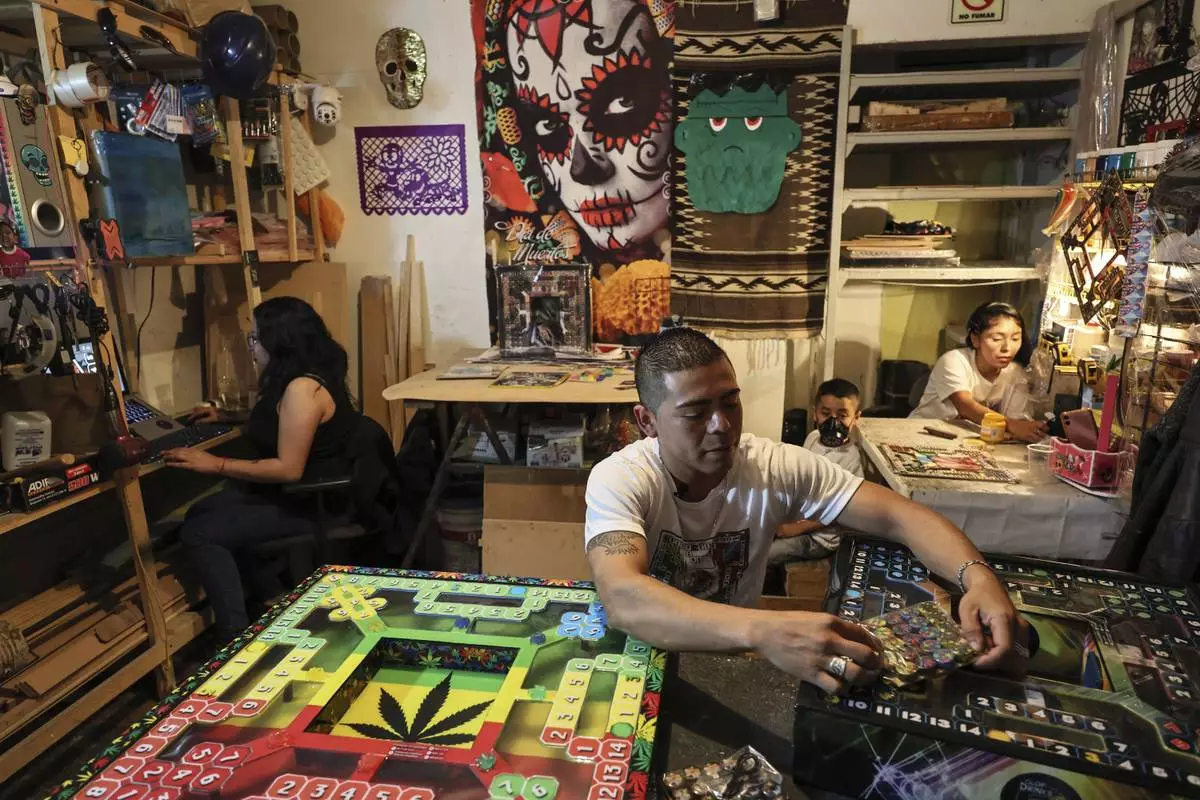
Diego Gonzalez, center, holds a pack of tokens for poleana, a board game invented in prison, alongside designer Carolina Duran, left, and Dana Lopez, his partner, with their son Kevin in the State of Mexico, Mexico, Friday, Oct. 25, 2024. (AP Photo/Ginnette Riquelme)
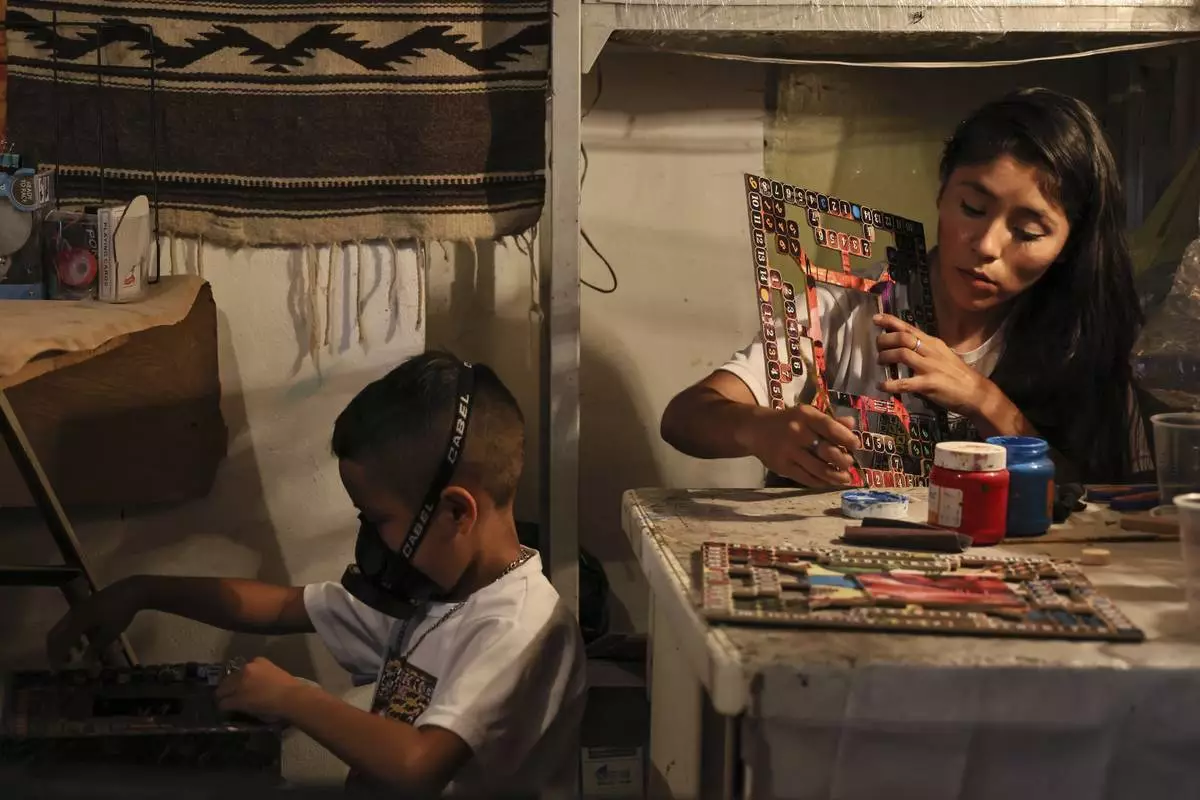
Dana Lopez, right, paints a board for poleana, a board game invented in prison, while her son Kevin plays in their workshop in the State of Mexico, Mexico, Friday, Oct. 25, 2024. (AP Photo/Ginnette Riquelme)
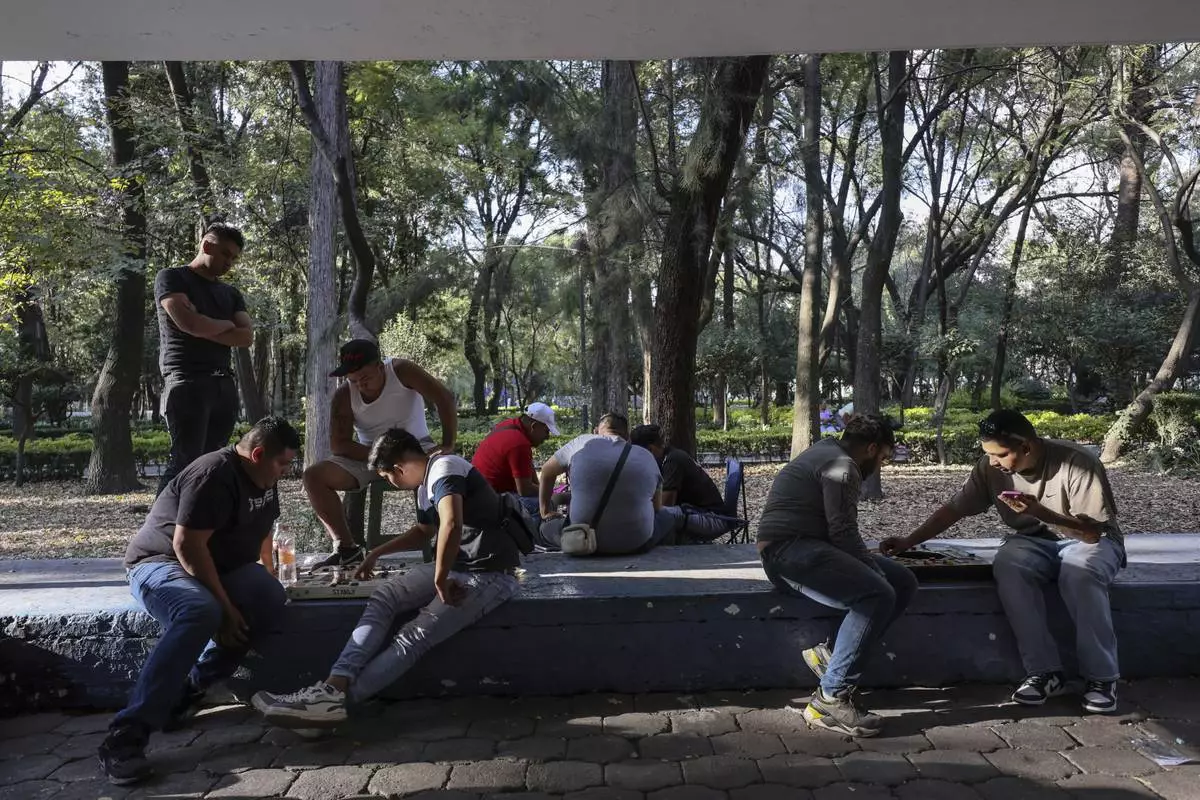
Participants play Poleana, a board game invented in prison, during a tournament in Mexico City, Sunday, Nov. 17, 2024. (AP Photo/Ginnette Riquelme)
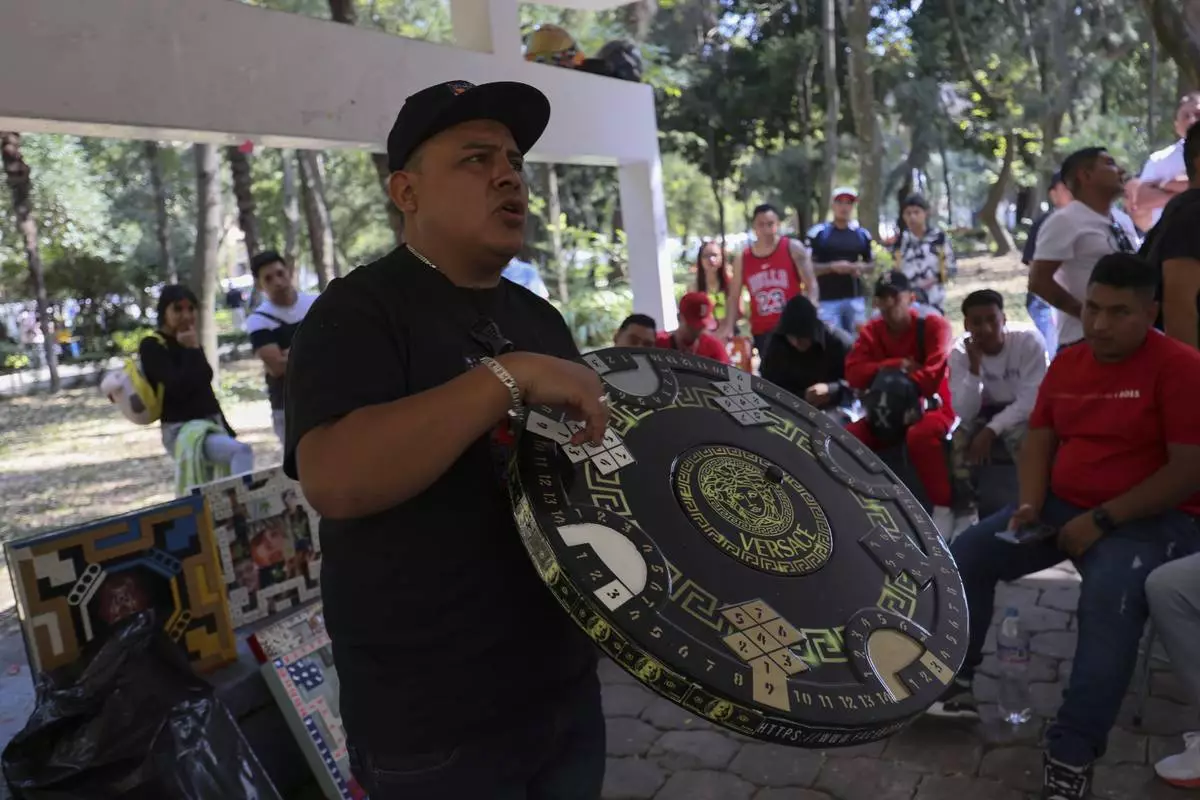
Jonathan Rulleri, the founder of Poleanas Canada Frogs, holds up a poleana board, a game he invented in prison, to be raffled off before the start of a tournament in Mexico City, Sunday, Nov. 17, 2024. (AP Photo/Ginnette Riquelme)
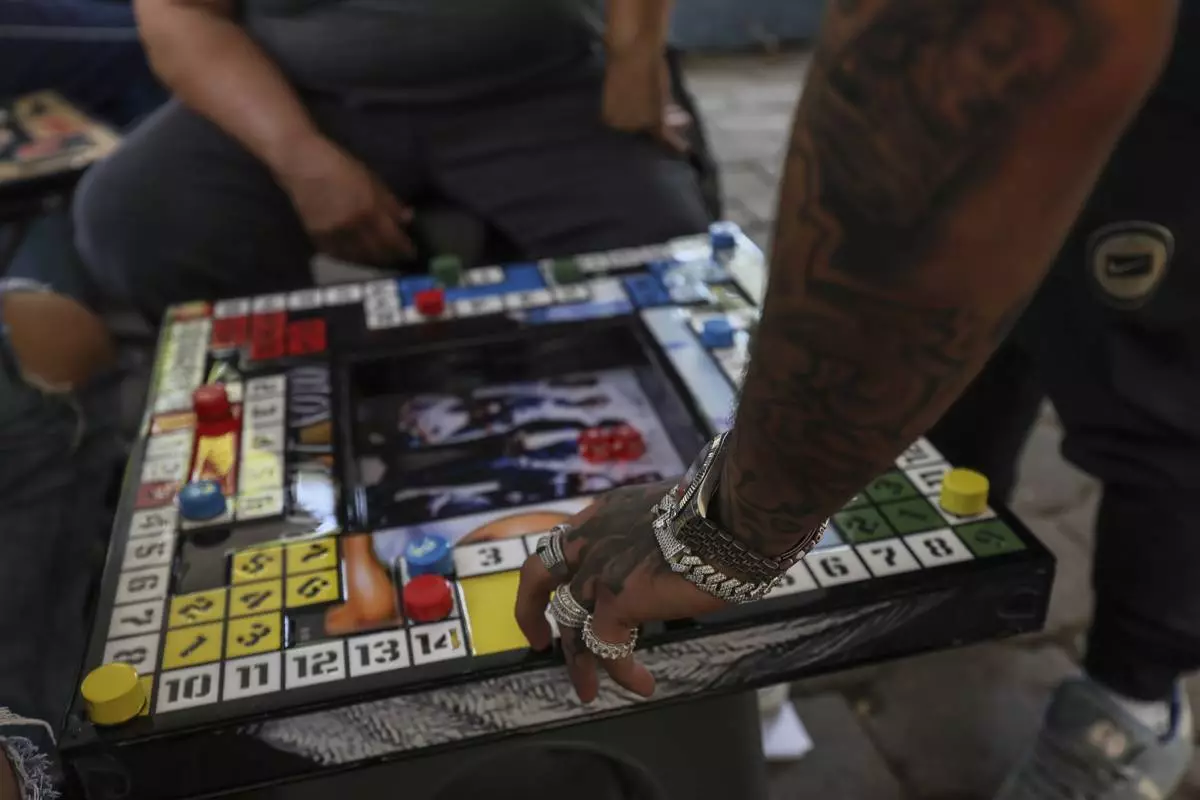
A player moves his piece in poleana, a board game invented in prison, during a tournament in Mexico City, Sunday, Nov. 17, 2024. (AP Photo/Ginnette Riquelme)
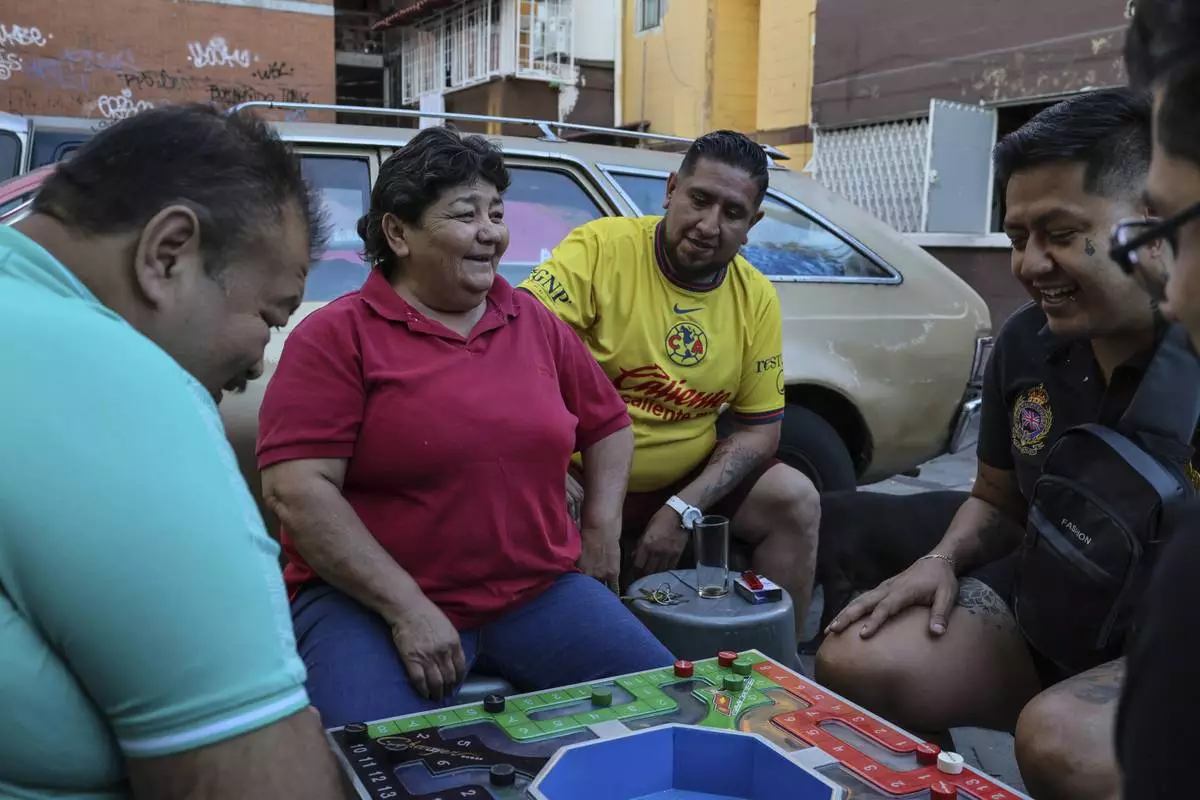
From left, Salvador Espinosa, Rosa Espinosa, Diego Castillo, Erik Cisneros and Ulises Tiscareño share a joke while playing poleana, a board game invented in prison in Mexico City, Sunday, Dec. 8, 2024. (AP Photo/Ginnette Riquelme)
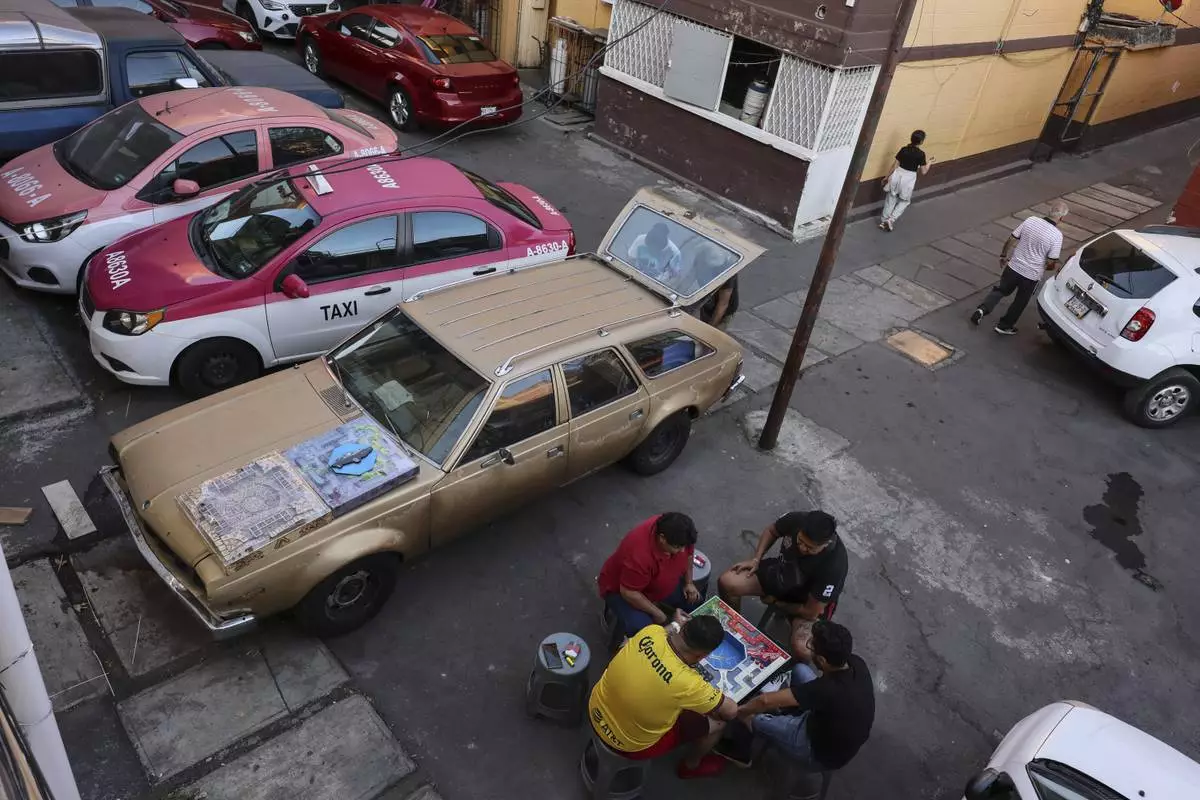
Residents play poleana, a board game invented in prison, in Mexico City, Sunday, Dec. 8, 2024. (AP Photo/Ginnette Riquelme)
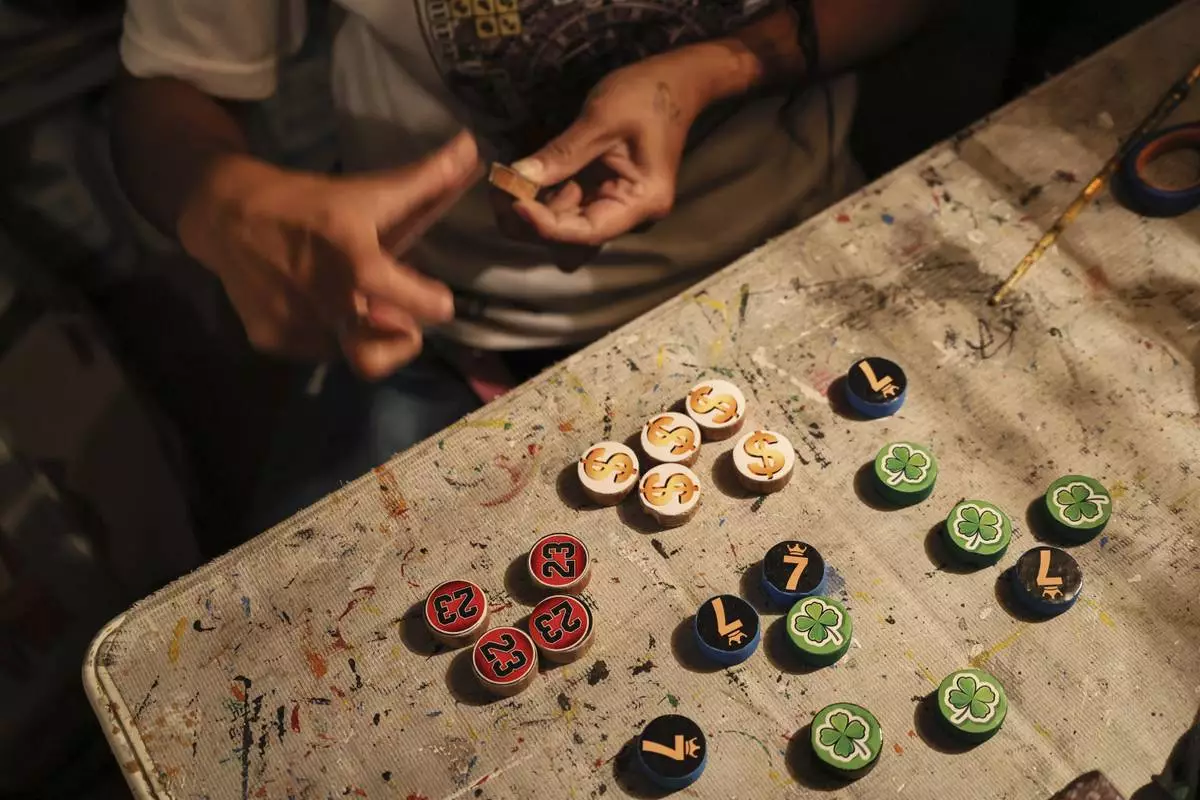
Dana Lopez sands a wooden token for poleana, a board game invented in prison, in his workshop in Mexico State, Mexico, Friday, Oct. 25, 2024. (AP Photo/Ginnette Riquelme)
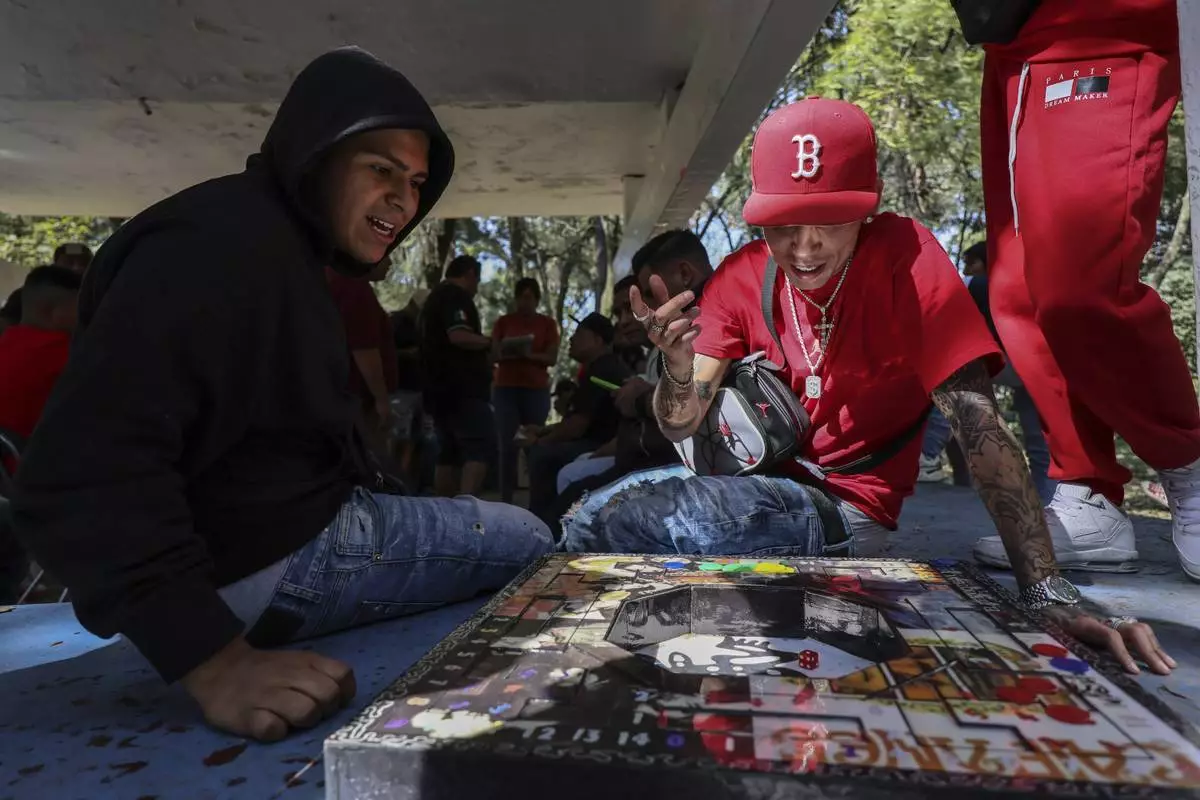
People play poleana, a board game invented in prison, before a tournament in Mexico City, Sunday, Nov. 17, 2024. (AP Photo/Ginnette Riquelme)















